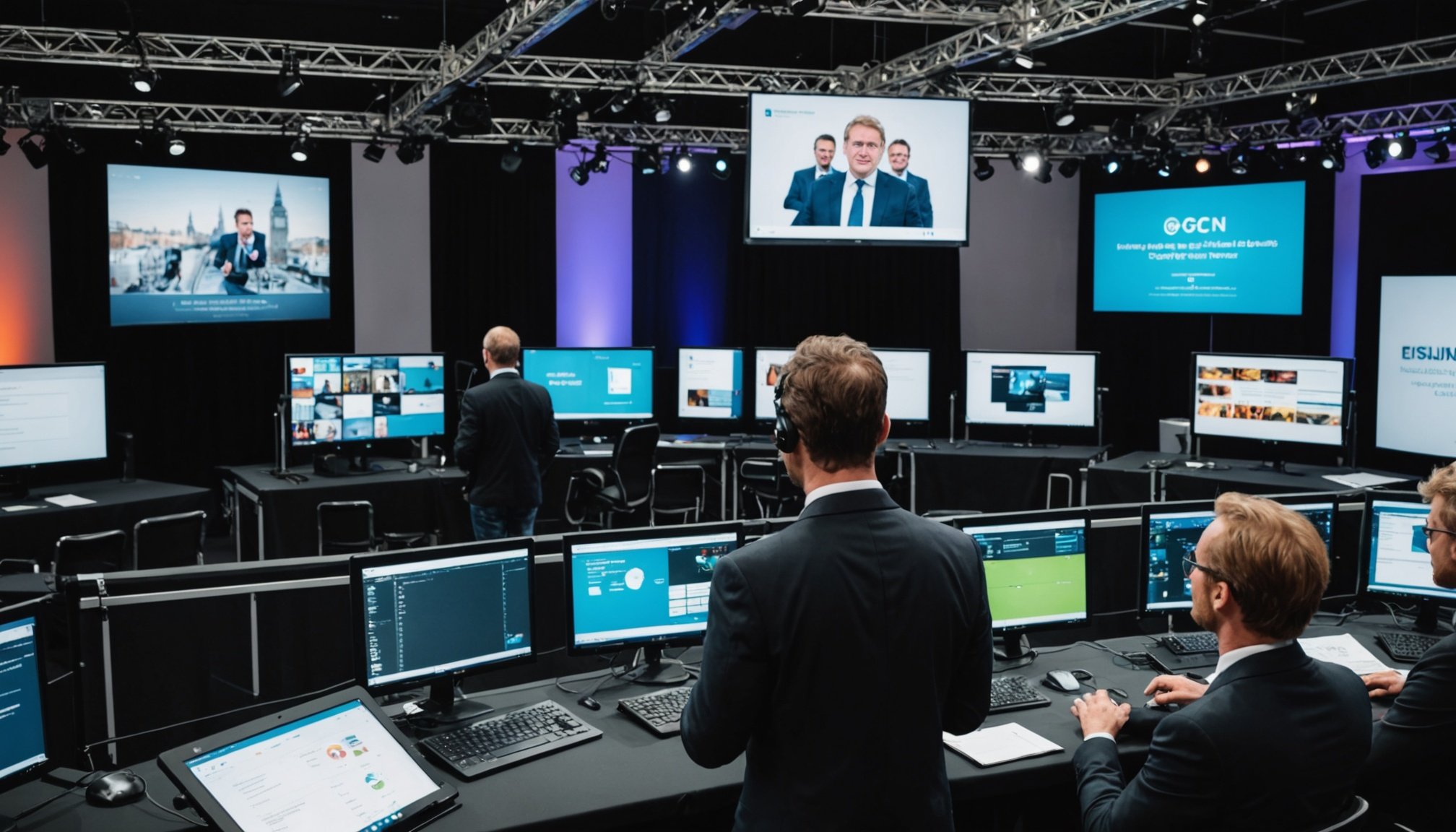Understanding Virtual and Hybrid Events
In the evolving landscape of event planning, distinguishing between virtual and hybrid events is crucial. Virtual events occur entirely online, where participants join from remote locations via digital platforms. On the other hand, hybrid events blend physical gatherings with virtual components, ensuring wider accessibility.
Current trends within the UK’s event planning sector highlight a surge in these formats, driven by technological advancements and changing audience expectations. Incorporating virtual elements into traditional events is becoming more significant, providing enhanced flexibility and engagement potential. This integration allows for audience expansion beyond geographical constraints, promising increased participation.
This might interest you : Effective Lead Generation Tactics to Propel UK B2B Companies Forward
Key advantages of integrating virtual aspects into events include real-time interaction and data collection, essential for refining future experiences. As the industry progresses, incorporating these elements efficiently can significantly enhance an event’s success and reach. Therefore, event planners should prioritise developing expertise in selecting appropriate technologies to facilitate seamless virtual and hybrid experiences.
Adopting such innovative approaches not only meets contemporary demands but also lays the groundwork for future-proofing events against unforeseen disruptions. As the need for adaptable formats increases, mastering the nuances of virtual and hybrid events becomes indispensable for modern planners aiming to deliver compelling and inclusive event experiences.
Also to read : Mastering Social Media: Effective Fundraising Strategies for UK Nonprofit Success
Essential Technology for Integration
In the realm of virtual and hybrid events, harnessing robust event technology is paramount. Key technology platforms, such as software tools and streaming services, are essential for seamless integration. These solutions facilitate smooth coordination and enhance attendee experience. When planning such events, selecting the right technology can amplify both reach and engagement.
Several platforms provide integrated solutions for event management, offering features like registration, ticketing, and analytics. Software tools like Hopin and Zoom Events stand out for their user-friendly interfaces and comprehensive functionality. They cater to various event sizes and formats, providing effective tools for organisers.
To gain the most from the technology, event planners should focus on functionality. Consider factors such as ease of use, integration capabilities, and scalability when assessing options. Opt for streaming services that ensure high-quality video and audio, as these are crucial for virtual and hybrid settings.
Choosing the right tools can significantly impact the success of your event. These platforms enable planners to deliver interactive, real-time experiences, bridging the gap between physical and virtual participants. By prioritising effective event technology, organisers can meet contemporary demands and elevate their event offerings.
Audience Engagement Strategies
Engaging the audience in both virtual events and hybrid events requires innovative approaches to enhance the attendee experience. Successful audience engagement strategies often include the use of interactive elements like live polls, Q&A sessions, and virtual breakout rooms. These features promote interaction and make participants feel more connected, regardless of their physical or virtual presence.
Implementing interactive features not only enhances engagement but also provides invaluable insights into attendee preferences and behaviours. For example, real-time polls can gauge audience interest, guiding event flow and content focus. Additionally, Q&A sessions offer attendees a platform to share their queries and receive immediate feedback, enriching the event’s value.
Case studies have highlighted creative engagement solutions. For instance, some UK events have integrated gamification elements into virtual platforms. This approach incentivizes participation through competitions and rewards, increasing involvement significantly.
To optimize engagement, it is crucial to tailor interactive strategies to the specific needs and preferences of your audience. Understanding the demographic and interest of participants will enable event planners to choose the most effective features. By fostering deeper connections with attendees, event organisers can transform virtual events and hybrid events into memorable and successful experiences.
Logistics of Planning Hybrid Events
When delving into the logistics of planning hybrid events, several factors demand meticulous attention. Coordination between virtual and on-site elements is vital for a seamless experience. Prioritising efficient event logistics ensures that both in-person and remote participants enjoy a cohesive event.
One crucial aspect is the selection and layout of the venue. Opt for venues that offer robust internet connectivity and advanced AV capabilities to support the virtual components. The setup should facilitate smooth interaction between all attendees while hosting engaging activities in person and online.
Coordinating various elements, including technology and personnel, is key to successful event execution. Implementing best practices, such as assigning dedicated teams for virtual and physical segments, can optimise coordination. Clear communication between these teams enhances efficiency, reducing potential technical difficulties.
To streamline operations, consider using event platforms that offer integrated logistic solutions. These tools assist in managing registration, scheduling, and real-time updates. Moreover, creating detailed contingency plans prepares the team for unexpected challenges, ensuring a successful hybrid event.
Planning a hybrid event requires strategic logistics and preparation. By focusing on essential aspects, like venue selection and effective collaboration between virtual and physical teams, organisers can create memorable experiences that engage all participants.
Best Practices for Marketing Hybrid Events
Creating effective event marketing strategies is essential for reaching both virtual and physical attendees successfully. To ensure broad visibility, implementing promotion strategies that resonate with your target audience is vital. Here’s a look at some effective approaches:
-
Leverage Social Media Platforms: Utilise platforms like Facebook, Instagram, and LinkedIn to generate buzz and engage potential participants. Tailor content to suit each platform’s audience, using captivating visuals and interactive posts to drive interest.
-
Email Marketing Campaigns: Personalised email newsletters can effectively disseminate event information and updates. Segment your audience to send targeted messages that enhance connection and encourage registration.
-
Influencer Partnerships: Collaborate with industry influencers to leverage their reach and credibility. Influencers can amplify your message and generate organic interest through authentic engagement.
-
Engaging Content Creation: Develop video teasers, blog posts, and podcasts that highlight event features. Provide value-centric content that informs while exciting your prospective audience.
For example, some success stories highlight events that utilised a mix of these strategies, resulting in substantial engagement. By reflecting on these case studies, event planners can adopt a diverse and strategic approach to marketing hybrid events, ensuring they captivate and connect with a broader audience effectively.
Measuring Success and Gathering Feedback
Evaluating the success of virtual and hybrid events relies heavily on precise event analytics and thorough feedback collection. Utilising effective success metrics is crucial for determining what worked well and identifying areas for improvement. Key metrics include participant numbers, engagement levels, and session attendance.
Collecting attendee feedback is equally vital. Feedback provides insights into the attendee experience and highlights what aspects of the event they found most engaging or valuable. Surveys, polls, and live chat logs can offer direct insights, helping planners understand audience preferences and areas needing enhancement.
Tools such as Google Analytics, SurveyMonkey, and specialised event platforms offer robust capabilities for tracking these metrics. They can analyse data on engagement, providing a comprehensive view of the event’s performance. These tools not only measure engagement but also help identify trends over time.
Incorporating a structured feedback mechanism post-event enables planners to refine future strategies. This continuous improvement loop is essential for maintaining audience interest and enhancing overall event success.
Accurate evaluation through analytics and feedback not only helps quantify success but also builds the foundation for more engaging and successful future events. By focusing on specific metrics and in-depth attendee insights, planners can effectively improve their event offerings.
Learning from Successful Case Studies
Exploring case studies of successful hybrid events offers invaluable insights. These real-world examples provide a blueprint for event planning, showcasing effective best practices and innovative strategies.
One notable example is a leading tech conference that skilfully combined virtual and in-person elements. The event organisers used state-of-the-art event technology to facilitate seamless interaction between attendees across platforms. This integration allowed them to expand their audience reach significantly, demonstrating the potential of hybrid events in the industry.
Lessons learned from such events emphasize the importance of meticulous planning. Ensuring robust infrastructure for both virtual and physical components is crucial for success. Organisers implemented dedicated teams to manage distinct aspects of the event, ensuring smooth coordination and execution.
Key takeaways include prioritising flexibility and adaptability in your planning process. By analysing these success stories, planners can identify what elements contributed to their effectiveness. Applying these insights can enhance your own events, ensuring they are engaging and impactful.
Consider how these success stories illustrate the possibilities within the event planning sector. They offer a guide for planners looking to elevate their event offerings, presenting tested solutions and approaches that align with current industry trends and audience expectations.
Resources and Further Reading
To excel in event planning, exploring various additional resources is essential. Numerous event planning guides are available that offer a wealth of information to enhance your understanding. These guides provide insights into emerging trends, best practices, and innovative strategies for both virtual events and hybrid events. Engaging with such resources can equip planners with the skills needed to navigate the complexities of today’s event landscape.
For those seeking expert insights, consider following professional organizations and industry leaders who publish regular blogs and research. These experts share valuable experiences and advice that can be instrumental in refining your strategies and improving event success. Attending webinars and workshops is another effective way to stay informed about current trends and technological advancements.
Recommended reads include comprehensive guides like ‘The Event Manager’s Bible’ and online platforms such as Eventbrite’s blog, which frequently updates on innovations in event technology and marketing. Additionally, upcoming webinars from renowned organisations offer opportunities for learning and networking with peers.
Exploring these resources not only broadens your knowledge but also provides practical tools and methodologies to refine and elevate your event planning capabilities in a competitive market.





